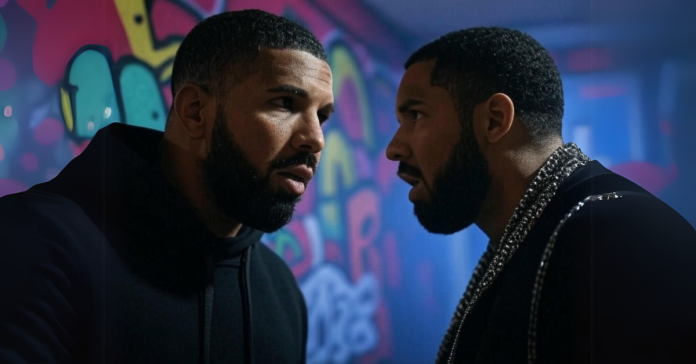Drake enjoyed complete dominance in the music industry no more than three years ago. The streaming king. The billboard chart dominator. His meme-making ability transformed any dance creation into worldwide viral success. Now? The hip-hop musical world seems to undergo an enormous change because many fans and artists are attempting to take the crown from Drake. So what exactly happened? Drake remains unscathed in his position as 6 God even as his career continues its perpetual development.
The Kendrick Effect: When Beef Gets Too Real
Indeed, I am not arguing that Drake has not survived beefs in the past. The man effectively check mated Meek Mill with “Back to Back” and barely flinched in his battle with Pusha T though those “you are hiding a child” bar still hurt sometimes. But this Kendrick situation? Whole different ballgame.
When Kendrick Lamar released the “Not Like Us,” it shifted the vibe of the culture. It was not one of many diss tracks but rather it turned into an anthem. Some individuals who never had any interest in the rap beef suddenly became serenading the parties with “THAT AIN’T YOUR REAL VOICE.” These were no longer concerned with rap credibility only but more personal aspects relating to Drake’s personality, his dealings, and virtue.
The Constant Reinvention Problem
However, we must recall when Drake was the sentimental and self-reflective rapper that blessed us with “Marvin’s Room”. He knows the charisma of being the dancehall Drake of “One Dance.” Then the UK drill Drake. Then the house music Drake with “Honestly, Nevermind.”
But what was supposed to be its virtue was slowly turned into a criticism that these transformations are nothing but one hit chasing another – an attempt to jump from one trend to another. Unlike other artists who grow with the various forms of music, critics argue that Drake only touches on other musical styles and genres, and just samples them without feeling the culture of the particular genre.
The Overexposure Reality
It is now impossible not to be constantly reminded of Drake, as we have been struggling through his discography for over ten years. From streaming records on the ‘O’ give or take records, from being a meme, to courtside seats at basketball games, to that weird heart haircut in his hair, anyone who has had access to modern entertainment has in one way or another been subjected to the Drake experience.
Such an approach can be a boon or bane for the celebrities used in the promotion as their image becomes over-exposed to the public. While it sustained his pertinence it also led to the development of the Drake overkill effect. Some began to wonder if he was always around because of good work or due to promotion. The element, which once made him cool and unique slowly started fading while the backlash, which was bound to happen to anyone with that level of fame, arrived.
The Collaborative Collapse
One of the Drake’s superpowers that have remained very distinct from his earlier years into his currently recognized present has been his prowess in being able to bring the best out from everybody as well as make himself better through collaborations. Thus, from Rihanna to Bad Bunny to Lil Baby, a Drake feature used to be the golden ticket.
In recent times though, few superstars are keen to collaborate with him intensely. But maybe due to the Kendrick case or anything else of the industry politics, the co-op environment has changed. Old collaborators such as the Weeknd are now avoiding him and the new generation of artists do not seem to be interested in being associated with his name.
The Numbers Don’t Lie… Or Do They?
If we are speaking sheer chart positions and streaming, yes, Drake is still an extraordinary commercial entity. His projects are still released as the first, and the performances in the streaming sector remain unprecedented. On balance, according to simple mathematical calculations, the empire looks quite solid.
However, simply by numbers, such a description did not seem to give the whole picture. The topic of discussion related to his music has shifted. Stakeholders reactions to his work have also become mixed, as many papers before writing them giving credit to Varone are now criticizing his creations. Fans were more polarized than before and most of them complained of low quality works in comparison to former productions.
The Personal Brand Paradox
It became a comedy, though, when Drake made it his persona: the stereotypically sensitive man who gets lost in his emotions, the man who could speak for all of us about the ups and downs of dating, and humility when it comes to money. It worked because the audiences did not feel that he had become an elitist or spoilt singer with his new-found success and riches.
In the past few days, though, there has been a sense that the two are no longer dancing together in this discourse. Since he was rapping about private jets, expensive time pieces, and rubbing shoulders with the elites, he has disassociated himself from the lower class. When he raps about “rich flex” at the time most people are struggling financially then Ludacris loses this essential ingredient.
So… Is It Actually Over?
Here is the thing about writing off Drake: it’s been done countless of times, yet Drake is consistently coming back and proving everyone wrong. This has become the man’s trademark as he continues to rise, adapt and transform each time around when everyone thinks we know him quite well.
What Drake needs is not some relief to go back to old days, this would be a very step back now. What he needs is to return the inspiration and make music from a different perspective than having one’s emphasis on chart positions.
Can he reverse this trajectory? Absolutely. Will he? That of course depends on whether he is quite willing, ready to go for such a requisite and especially the risks that found him stardom in the first place and not because of market demands and analysis.
The Legacy Question
However, one cannot dispute the influence which Drake contributed to the evolution of music. He influenced what could be considered a rapper, appeared as the precursor of singing mashed with rapping, and laid down route maps upon which many have drawn.
But legacies are complicated things. They are not just about one’s success and how good they have it but they show you how a person handles failure, how they withstand/settle when the going gets tough.
For now, we’re all watching the throne, waiting to see if the king can reclaim it, or if it’s time for a new era in hip-hop to truly begin.

